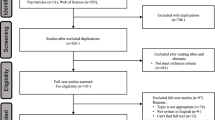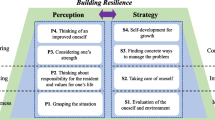Abstract
This chapter presents an explorative study of resilience and thriving among 20 health care professionals employed in a public sector hospital in South Africa. The convenience sample consisted of 12 registered nurses and eight physicians. A phenomenological, qualitative design was used. Semi-structured focus group discussions were conducted with the participants to explore their experience of resilience and thriving in the workplace. Information was analysed using thematic content analysis. The majority of the participants reported high levels of satisfaction and engagement despite challenging work conditions. The emerging themes reflect a range of dispositional, relational, situational, and philosophical factors that contribute to their satisfaction and work engagement. The role of personal values, such as compassion for patients, nurturance, and a sense of justice, plays a role in the value-driven engagement of doctors and nurses, while positive feedback from patients and collegial relationships serves a protective role. Coping strategies used by participants include restorative leisure activities, self-care, and work-family balance. Very few differences were noted between the themes reported by doctors and nurses, respectively. Intellectual stimulation and opportunities for professional development seemed to play a stronger motivating role for the doctors, while nurses emphasized the role of positive relationships with patients. The study concludes that knowledge of factors that contribute to positive affective-motivational states and effective strategies to promote well-being are essential to sustaining high quality health service delivery.
Access this chapter
Tax calculation will be finalised at checkout
Purchases are for personal use only
Similar content being viewed by others
References
Bakker, A. B., & Derks, D. (2010). Positive occupational health psychology. In S. Leka & J. Houdmont (Eds.), Occupational health psychology (pp. 194–224). Chichester, UK: Blackwell.
Bakker, A. B., & Leiter, M. P. (2010). Where to go from here: Integration and future research on work engagement. In A. B. Bakker & M. P. Leiter (Eds.), Work engagement: A handbook of essential theory and research (pp. 181–196). New York: Psychology Press.
Bakker, A. B., & Schaufeli, W. B. (2008). Positive organisational behaviour: Engaging in flourishing organizations. Journal of Organizational Behavior, 29, 147–154.
Balch, C. M., & Copeland, E. (2007). Stress and burnout among surgical oncologists: A call for personal wellness and a supportive workplace environment. Annals of Surgical Oncology, 14(11), 3029–3032.
Balch, C. M., & Shanafelt, T. (2010). Combating stress and burnout in surgical practice: A review. Journal of Medical Systems, 44, 29–47.
Bamber, M. R. (2007). CBT for occupational stress in health professionals. London: Routledge.
Bartley, M., Schoon, I., Mitchell, R., & Blane, D. (2011). Resilience as an asset for healthy development. Retrieved from http://www.ucl.ac.uk/capabilityandresilience/resilienceasasset forhealthydevelopment.doc
Bressi, C., Manenti, S., Porcellana, M., Cevales, D., Farina, L., Feliciani, I., et al. (2008). Haemato-oncology and burnout: An Italian survey. British Journal of Cancer, 98, 1046–1052.
Britt, T. W., Dickenson, J. M., Greene-Shortridge, T. M., & McKibben, E. S. (2007). Self-engagement at work. In D. L. Nelson & C. L. Cooper (Eds.), Positive organizational behavior (pp. 143–158). Thousand Oaks, CA: Sage.
Carver, C. S. (1998). Resilience and thriving: Issues, models, and linkages. Journal of Social Issues, 54(2), 245–266.
Chan, D. W. (2009). Burnout and the antithesis of burnout: Developing positive interventions for the well-being of Chinese teachers in Hong Kong. In R. V. Schwartzhoffer (Ed.), Psychology of burnout (pp. 39–62). New York: Nova Science.
Cresswell, J. W., Hanson, W. E., Plano, V. L. C., & Morales, A. (2007). Qualitative research designs: Selection and implementation. The Counseling Psychologist, 35(2), 236–264.
Department of Health. (2006). Report on HIV and syphilis prevalence survey South Africa 2006. Pretoria, South Africa: Department of Health.
Fritz, C., & Sonnentag, S. (2006). Recovery, well-being, and performance related outcomes: The role of workload and vacation experiences. Journal of Applied Psychology, 91, 936–945.
Gillespie, M., & Melby, V. (2003). Burnout among nursing staff in accident and emergency and acute medicine: A comparative study. Journal of Clinical Nursing, 12, 842–851.
Jackson, D., Firtko, A., & Edenborough, M. (2007). Personal resilience as a strategy for surviving and thriving in the face of workplace adversity: A literature review. Journal of Advanced Nursing, 60(1), 1–9.
Knoop, R. (2010). Work values and job satisfaction. Journal of Psychology, 128(6), 683–690.
Lin, B. Y., Hsu, C. C., Chao, M., Luh, S., Hung, S., & Breen, G. (2008). Physician and nurse job climates in hospital-based emergency departments in Taiwan: Management and implications. Journal of Medical Systems, 32(4), 269–281.
Luthans, F., Vogelsang, G. R., & Lester, P. B. (2006). Developing the psychological capital of resiliency. Human Resource Development Review, 5(1), 25–44.
Luthans, F., Yousseff, C. M., & Avolio, B. J. (2007). Psychological capital: Developing the human competitive edge. New York: Oxford University Press.
Masten, A. S. (2001). Ordinary magic: Resilience processes and development. American Psychologist, 56(3), 227–238.
Masten, A. S., Best, K. M., & Garmezy, N. (1990). Resilience and development: Contributions from the study of children who overcome adversity. Development and Psychopathology, 2, 425–444.
Masten, A. S., & Reed, M. J. (2005). Resilience in development. In C. R. Snyder & S. J. Lopez (Eds.), Handbook of positive psychology (pp. 74–89). New York: Oxford University Press.
Naudé, J. L., & Rothmann, S. (2006). Work-related well-being of emergency workers in Gauteng. South African Journal of Psychology, 36(1), 63–81.
Neumann, W. L. (1997). Social research methods: Qualitative and quantitative approaches. Boston: Allyn & Bacon.
Nickel, S., & Quintini, G. (2002). The recent performance of the UK labour market. Oxford Review of Economic Policy, 18(2), 202–220.
O’Leary, V. E. (1998). Strength in the face of adversity: Individual and social thriving: Broadening the paradigm beyond illness to health. Journal of Social Issues, 54, 425–446.
O’Leary, V. E., & Ickovics, J. R. (1995). Resilience and thriving in response to challenge: An opportunity for a paradigm shift in women’s health. Women’s Health Summer, 1(2), 121–142.
Park, N., Peterson, C., & Seligman, M. E. P. (2004). Strengths of character and well-being. Journal of Social and Clinical Psychology, 23(5), 603–619.
Peterson, C., & Park, N. (2004). Classification and measurement of character strengths: Implications for practice. In A. Linley & S. Joseph (Eds.), Positive psychology in practice (pp. 433–446). New York: Wiley.
Pillay, Y. (2001). The impact of South Africa’s new constitution on the organisation of health services in post-apartheid era. Journal of Health Politics and Law, 26(4), 747–766.
Polk, L. (1997). Toward a middle-range theory of resilience. Advanced Nursing Science, 19, 1–13.
Ramirez, A. J., Graham, J., Richards, M. A., Cull, A., & Gregory, W. M. (1996). Mental health of hospitals consultants: The effects of stress and satisfaction at work. Lancet, 347, 724–728.
Rutter, M. (1985). Resilience in the face of adversity: Protective factors and resistance to psychiatric disorder. The British Journal of Psychiatry, 147, 598–611.
Schaufeli, W. B., Bakker, A. B., & Salanova, M. (2006). The measurement of work engagement with a short questionnaire: A cross national study. Educational and Psychological Measurement, 66(4), 701–716.
Schulte, P., & Vainio, H. (2010). Well-being at work – Overview and perspective. Scandinavian Journal of Work, Environment and Health, 36(5), 422–429.
Seligman, M. E. P. (2005). Positive psychology, positive prevention and positive therapy. In C. R. Snyder & S. J. Lopez (Eds.), Handbook of positive psychology (pp. 3–12). New York: Oxford University Press.
Shanafelt, T. D., Balch, C. M., Bechamps, G. J., Russle, T., Dyrbye, L., Satele, D., et al. (2009). Burnout and career satisfaction among American surgeons. Annals of Surgery, 250(3), 463–471.
Smit, J. (2006). The influence of coping and stressors on burnout and compassion fatigue among health care professionals. An unpublished doctoral dissertation, Department of Psychology, University of the Free State, Bloemfontein, South Africa.
South African Government Website. (2009). Free state province. Retrieved from http://www.ofs.ac.za
Spreitzer, G. M., Lam, C. F., & Fritz, C. (2010). Engagement and human thriving: Complimentary perspectives on energy and connections to work. In A. B. Bakker & M. P. Leiter (Eds.), Work engagement: A handbook of essential theory and research (pp. 132–146). New York: Psychology Press.
Spreitzer, G. M., & Sutcliffe, K. M. (2007). Thriving in organizations. In D. L. Nelson & C. L. Cooper (Eds.), Positive organizational behavior (pp. 74–85). Thousand Oaks, CA: Sage.
Spreitzer, G. M., Sutcliffe, K. M., Dutton, J., Sonenshein, S., & Grant, A. M. (2005). A socially embedded model of thriving at work. Organization Sciences, 16(5), 537–549.
Strümpfer, D. J. W. (2005). Standing on the shoulder of giants: Notes on early positive psychology (psychofortology). South African Journal of Psychology, 3(1), 21–25.
Tveito, T. H., & Eriksen, H. R. (2008). Integrated health programme: A workplace randomized controlled trial. Journal of Advanced Nursing, 65(1), 110–119.
Van den Berg, H. S., Bester, C. L., Janse Van Rensburg-Bonthuyzen, E., Engelbrecht, M., Hlophe, H., & van Rensburg, H. C. J. (2006). Burnout and compassion fatigue in professional nurses: A study in PHC facilities in the free state, with special reference to the antiretroviral treatment programme. Bloemfontein, South Africa: Centre for Health Systems Research and Development, University of Free State.
Van Niekerk, J. P. (2006). Doctors as migratory labourers. South African Medical Journal, 96(3), 155.
Van Rensburg, H. C. J. (2004). The health professions and human resources for health – Status, trends and care issues. In H. C. J. Van Rensburg (Ed.), Health and health care in South Africa (pp. 316–376). Pretoria, South Africa: Van Schaik.
Walker, L., & Gilson, L. (2004). “We are bitter but we are satisfied”: Nurses as street-level bureaucrats in South Africa. Social Science & Medicine, 59, 1251–1261.
Weiss, H. M. (2002). Deconstructing job satisfaction: Separating evaluations, beliefs and affective experiences. Human Resource Management Review, 12, 173–194.
Xanthopoulou, D., Bakker, A. B., Demerouti, E., & Schaufeli, W. B. (2009). Reciprocal relationships between job resources, personal resources, and work engagement. Journal of Vocational Behavior, 74, 235–244.
Author information
Authors and Affiliations
Corresponding author
Editor information
Editors and Affiliations
Rights and permissions
Copyright information
© 2013 Springer Science+Business Media Dordrecht
About this chapter
Cite this chapter
van den Berg, H.S. (2013). Resilience and Thriving Among Health Professionals. In: Wissing, M. (eds) Well-Being Research in South Africa. Cross-Cultural Advancements in Positive Psychology, vol 4. Springer, Dordrecht. https://doi.org/10.1007/978-94-007-6368-5_8
Download citation
DOI: https://doi.org/10.1007/978-94-007-6368-5_8
Published:
Publisher Name: Springer, Dordrecht
Print ISBN: 978-94-007-6367-8
Online ISBN: 978-94-007-6368-5
eBook Packages: Behavioral ScienceBehavioral Science and Psychology (R0)




